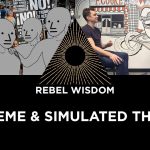
Jordan Peterson on the mindless #NPC‘s who repetitively spew forth their ideology without actually having thought themselves to their own conclusions. “People don’t have ideas. Ideas have people.” ―Carl Jung We’ve created an integrative methodology called “the Unity Process“, which combines the Hermetic Principles (Natural Law), the Trivium Method, Socratic Questioning, Jungian shadow work, and the Emotional Freedom Techniques (meridian tapping)—into an easy to use system that allows people to […] Read more »













